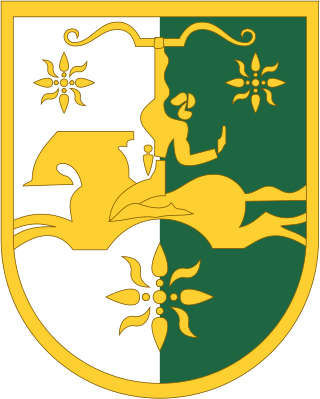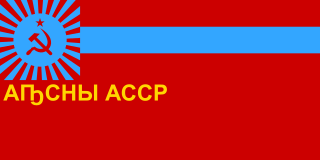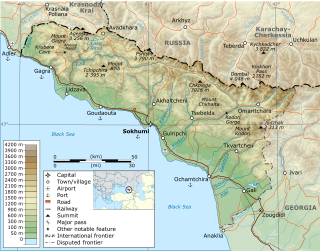 |
|---|
| Constitution |
Elections to the People's Council were held in Abkhazia on 13 February 1919, alongside parliamentary elections in Georgia. [1]
 |
|---|
| Constitution |
Elections to the People's Council were held in Abkhazia on 13 February 1919, alongside parliamentary elections in Georgia. [1]
The Social Democrats won 27 of the 40 seats; 11 members of the party were Abkhazians and 11 Georgians, with the remaining five having other ethnicities. [1] Seats were also held by social federalists, an Abkhaz independent socialist group, Socialist Revolutionaries, people's democrats and colonists. [2]
Of the 40 members, 18 were Abkhazian, 16 Georgian and six from other ethnic groups. [1]
Following its election, the Council split along ethnic lines, with Abkhaz members of the Social Democratic Party joining the independent socialists to form an Abkhaz opposition. [2] Despite the split, the Council voted in favour of Abkhazia being an autonomous region of Georgia. [3]
Viacheslav Mikhail-ipa Tsugba was the third Prime Minister of the Republic of Abkhazia from December 1999 to May 2001. Before his appointment as Prime Minister, Tsugba had headed the Central Election Committee, which had overseen the internationally unrecognised simultaneously held October 1999 presidential election and constitutional referendum.

Politics in Abkhazia is dominated by its conflict with Georgia. Abkhazia became de facto independent from Georgia after the 1992–1993 war, but its de jure independence has only been recognised by a few other countries. Abkhazia is a presidential representative democratic republic with a multi-party system, wherein the President is both head of state and head of government. Executive power is exercised by the government of the Republic of Abkhazia. Legislative power is vested in both the government and the People's Assembly of Abkhazia.

The Abkhaz–Georgian conflict involves ethnic conflict between Georgians and the Abkhaz people in Abkhazia, a de facto independent, partially recognized republic. In a broader sense, one can view the Georgian–Abkhaz conflict as part of a geopolitical conflict in the Caucasus region, intensified at the end of the 20th century with the dissolution of the Soviet Union in 1991.

Abkhazians, or Abkhazes, are a Northwest Caucasian ethnic group, mainly living in Abkhazia, a disputed region on the northeastern coast of the Black Sea. A large Abkhaz diaspora population resides in Turkey, the origins of which lie in the population movements from the Caucasus in the late 19th century. Many Abkhaz also live in other parts of the former Soviet Union, particularly in Russia and Ukraine.

Irakli Alasania is a Georgian politician, soldier and former diplomat who served as the Minister of Defense of Georgia from 2012 to 2014. He was Georgia's Ambassador to the United Nations from September 11, 2006, until December 4, 2008. His previous assignments include Chairman of the Government of Abkhazia(-in-exile) and the President of Georgia's aide in the Georgian-Abkhaz talks. Soon after his resignation, Alasania withdrew into opposition to the Mikheil Saakashvili administration, setting up the Our Georgia – Free Democrats party in July 2009. In 2012 Alasania was appointed Minister of Defense, a position he held until 2014.

The Kingdom of Abkhazia, also known as Abasgia or Egrisi-Abkhazia, was a medieval feudal state in the Caucasus which was established in the 780s. Through dynastic succession, it was united in 1008 with the Kingdom of the Iberians, forming the Kingdom of Georgia.

The ethnic cleansing of Georgians in Abkhazia, also known in Georgia as the genocide of Georgians in Abkhazia, refers to the ethnic cleansing, massacres, and forced mass expulsion of thousands of ethnic Georgians living in Abkhazia during the Georgian-Abkhaz conflict of 1992–1993 and 1998 at the hands of Abkhaz separatists and their allies. Armenians, Greeks, Russians, and opposing Abkhazians were also killed.
The Sukhumi massacre took place on September 27, 1993, during and after the fall of Sukhumi into separatist hands in the course of the War in Abkhazia. It was perpetrated against Georgian civilians of Sukhumi, mainly by militia forces of Abkhaz separatists and North Caucasian allies. It became part of a violent ethnic cleansing campaign carried out by the separatists.
The Government of the Autonomous Republic of Abkhazia is an administration recognized by Georgia as the legal and only government of Abkhazia. Abkhazia has been de facto independent of Georgia – though with very little international recognition – since the early 1990s. Ruslan Abashidze, elected in May 2019, is the current head of the government-in-exile.

The history of Abkhazia, a region in the South Caucasus, spans more than 5,000 years from its settlement by the lower-paleolithic hunter-gatherers to its present status as a partially recognized state.

The Abkhaz Autonomous Soviet Socialist Republic, abbreviated as Abkhaz ASSR, was an autonomous republic of the Soviet Union within the Georgian SSR. It came into existence in February 1931, when the Socialist Soviet Republic of Abkhazia, originally created in March 1921, was transformed to the status of Autonomous Soviet Socialist Republic within the Georgian SSR.

The Socialist Soviet Republic of Abkhazia was a short-lived republic within the Caucasus region of the Soviet Union that covered the territory of Abkhazia, and existed from 31 March 1921 to 19 February 1931. Formed in the aftermath of the Red Army invasion of Georgia in 1921, it was independent until 16 December 1921 when it agreed to a treaty that united it with the Georgian Soviet Socialist Republic. The SSR Abkhazia was similar to an autonomous Soviet republic, though it retained nominal independence from Georgia and was given certain features only full union republics had, like its own military units. Through its status as a "treaty republic" with Georgia, Abkhazia joined the Transcaucasian Soviet Federative Socialist Republic, which united Armenian, Azerbaijani, and Georgian SSRs into one federal unit when the latter was formed in 1922. The SSR Abkhazia was abolished in 1931 and replaced with the Abkhaz Autonomous Soviet Socialist Republic within the Georgian SSR.

The War in Abkhazia was fought between Georgian government forces for the most part and Abkhaz separatist forces, Russian government armed forces and North Caucasian militants between 1992 and 1993. Ethnic Georgians who lived in Abkhazia fought largely on the side of Georgian government forces. Ethnic Armenians and Russians within Abkhazia's population largely supported the Abkhazians and many fought on their side. The separatists received support from thousands of North Caucasus and Cossack militants and from the Russian Federation forces stationed in and near Abkhazia.
The Sukhumi riot was a riot in Sukhumi, Abkhaz Autonomous Soviet Socialist Republic, Georgian Soviet Socialist Republic, Soviet Union, in July 1989, triggered by an increasing inter-ethnic tensions between the Abkhaz and Georgian communities and followed by several days of street fighting and civil unrest in Sukhumi and throughout Abkhazia.
This article is about the demographics of Abkhazia, including population density, ethnicity, education level, health, socioeconomic status, religious affiliations and other aspects of the population.

Parliamentary elections were held in Abkhazia on 23 November 1996, with a second round on 7 December. There was also a simultaneous referendum held amongst Abkhazian Refugees.

Abkhazia, officially the Republic of Abkhazia, is a partially recognised state in the South Caucasus, at the intersection of Eastern Europe and Western Asia. It lies on the eastern coast of the Black Sea in northwestern Georgia. It is recognised by most countries as part of the latter. It covers 8,665 square kilometres (3,346 sq mi) and has a population of around 245,000. Its capital and largest city is Sukhumi.
This is an alphabetical list of Abkhazia-related articles.
Ilia Chavchavadze Society is a political organisation from Georgia. The group dates back to the days of the Soviet Union, where it was an important factor in the growth of Georgian nationalism.

The Abkhazia–Georgia separation line is a de facto boundary set up in aftermath of the War in Abkhazia and Russo-Georgian War, which separates the self-declared Republic of Abkhazia from the territory controlled by the Government of Georgia. Republic of Abkhazia, and those states that recognise its independence, view the line as an international border separating two sovereign states, whereas the Georgian government and most other countries refer to it as an 'Administrative Border Line' within Georgian territory. The Georgian government views Abkhazia as a Russian-occupied Georgian territory and designates the de facto boundary as an occupation line in accordance with the Georgian "Law on Occupied Territories of Georgia". The Constitution of Georgia recognizes Abkhazia as autonomous within Georgia, therefore the line corresponds to the 'Administrative Border' of the Autonomous Republic of Abkhazia within Georgian territory.